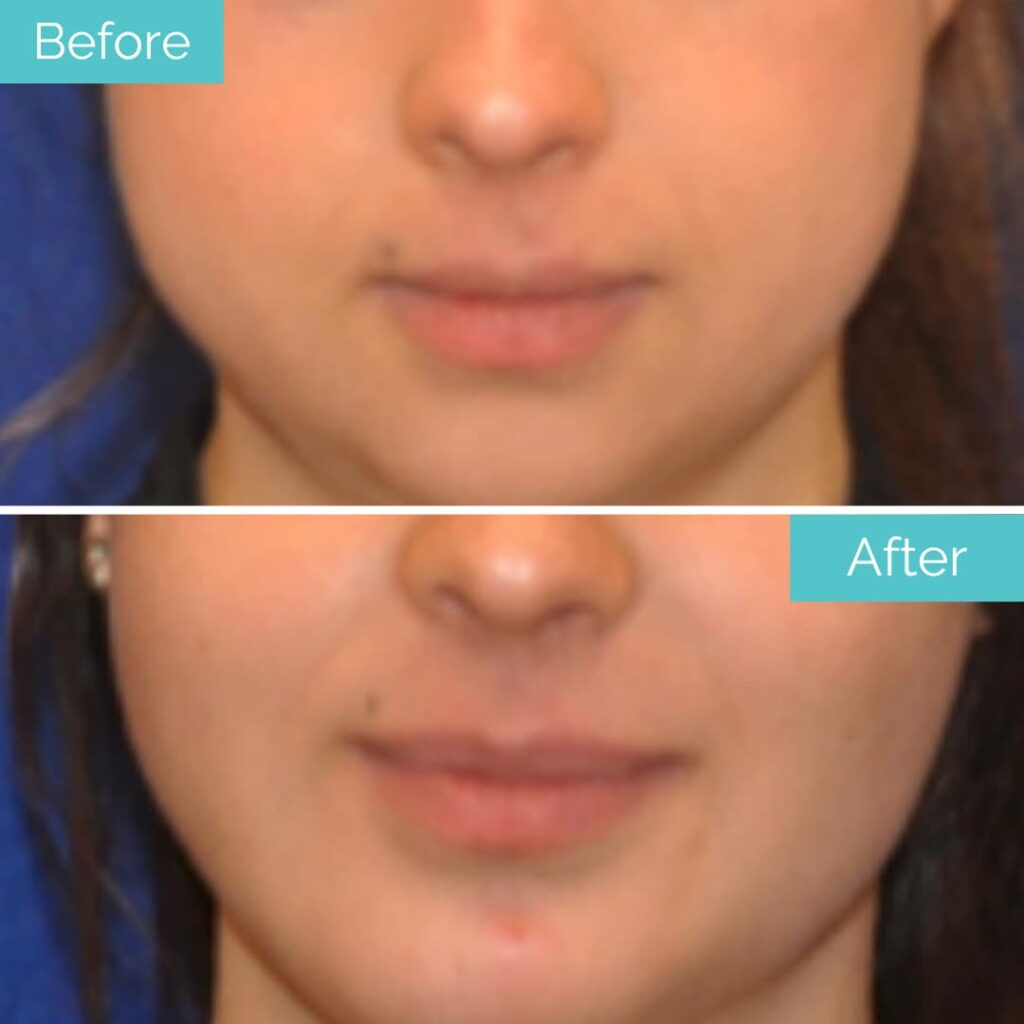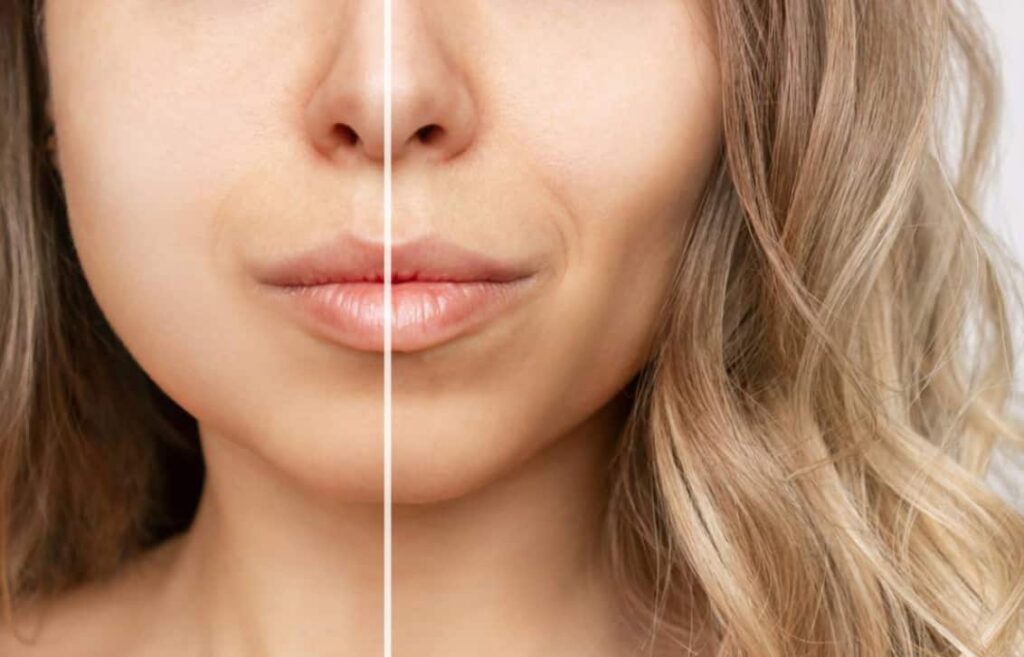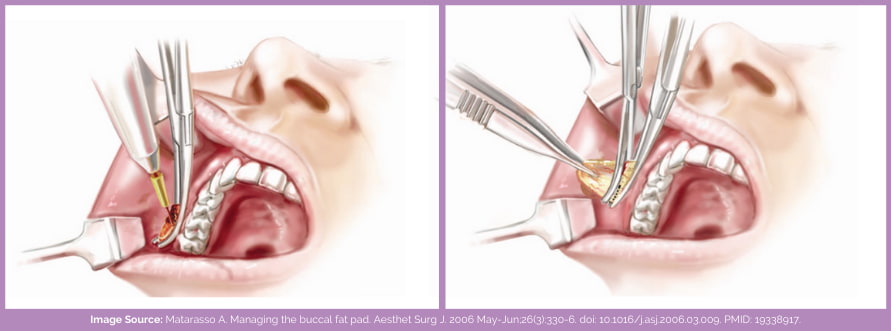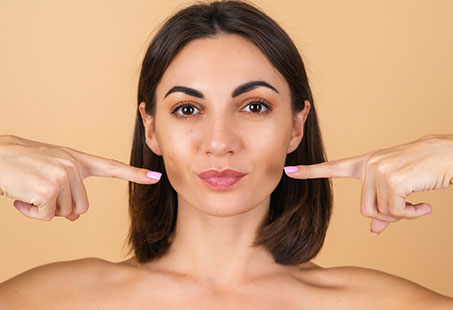Buccal fat removal is a facial contouring plastic surgery in which a small amount of fat is removed from each cheek for a more chiselled and mature look.
While the surgery’s gotten quite popular on social media, especially with model Chrissy Teigen openly admitting to it, there are some concerns about its potential long-term effects.
Even some surgeons are concerned about how this surgery can age the face years later, making people regret their decision. And these concerns are not unwarranted since you do lose facial fat with age.
However, the devil is in the details because it’s not exactly clear how much of the fat in your face you will lose with ageing. In fact, you might also lose more fat in some areas of the face than others. There’s also no saying how quickly you’ll lose that fat. So, you can still get this surgery, but it’s important that you’re the right candidate for it.
What Is Buccal Fat Removal?
Buccal fat removal, also known as bichectomy or cheek reduction surgery, is a type of procedure in which fat pads are removed from the lower cheeks for a sleeker contour. Although the surgery has only recently become quite well-known, it’s actually been around since the 18th century.

This buccal or cheek fat in question was first described by a French anatomist, Marie-François Xavier Bichat. This “protuberance,” or fat sticking out from the cheeks, was named after him as Bichat’s protuberance or Bichat ball.
Other than helping newborns suck, this fat pad is also believed to help with chewing in adults and provide extra protection to internal tissues. It’s even found uses in reconstructive surgeries where it’s been used as a graft and to repair fistulas – abnormal connection/passage between two organs.
The latter can happen following the extraction of a tooth and the death of the bone cells in the jaw (osteonecrosis of the jaw) due to a medicine, as reported in a study published in the Indian Journal of Surgical Oncology. According to the researchers of this study, this fat can also cover tooth roots and help cleft palate patients, among other things.
However, not everyone likes having it, and it’s because of how this fat shapes and affects the appearance of the face. Some complain of having “chipmunk cheeks,” owing to a significant amount of buccal fat. That’s where this surgery comes in for aesthetic facial rejuvenation.
However, before you undergo this surgery, you must be sure that it’s the buccal fat causing your cheeks to appear larger. Of course, for that, you need to consult a board-certified and experienced surgeon who knows what to look for. It’s possible for your cheeks to look bigger due to large jaw muscles (masseter Botox is used for that).
How Much Is Buccal Fat Removal?
In the UK, you may be able to get a buccal fat removal surgery for around £3,000. However, keep in mind that the price can vary depending on the location of the clinic, the experience of the surgeon, any additional procedures, the type of anaesthesia you’re getting, medications, aftercare, etc.
In Turkey, you can get the same surgery for less than £2,000. Plastic surgery in Turkey is generally cheaper because of the lower cost of living and the differences in the currency exchange rate.
Companies usually offer accommodation, transfers, medications and aftercare, along with surgery and anaesthesia to their patients.
Is Buccal Fat Removal Permanent?
Buccal fat removal gives permanent results. The fat is taken out from inside the cheeks so it cannot grow back. You can enjoy the results of this procedure for a lifetime. Although keep in mind that because of ageing, the quality of your skin will change.
Who Is A Good Candidate For Buccal Fat Removal?
A good candidate for buccal fat removal is someone who has very chubby cheeks. Exactly how “very” makes you suitable for this surgery can only be told to you by your surgeon.
But in general, the fat is very present and noticeable and hides the shape of your underlying bone structure in an unaesthetic way. It’s important to have a stable weight before the surgery, and you shouldn’t be a smoker either.

At the end of the day, you also need to have realistic expectations. Good surgeons will make sure to not extract a lot of fat from the cheeks because it will leave you with a gaunt look. So, the results might be more subtle.
Your surgeon will also check you for any illnesses that make you unsuitable for this surgery. For instance, according to StatPearls, malar hypoplasia – underdeveloped cheekbones – can make the results of a buccal fat look very poor.
How Is Buccal Fat Removal Done?
Buccal fat removal is usually done under local anaesthesia, so you will be awake during the surgery. After the anaesthesia takes effect, the surgeon will make an incision of 1cm inside your cheek (both sides) to remove the cut out the fat.

According to a study published in the Aesthetic Surgery Journal, on average, 2.6 mL of fat is cut out from each cheek (it can be about the size of your thumb). Once it’s done, the skin is sutured back up with dissolvable stitches.
On its own, buccal fat removal might not take more than 30 minutes. However, people usually combine it with other procedures like a facelift, liposuction, rhinoplasty, implants, dermal fillers, etc., for a more dramatic improvement/addressing different problem areas.
In that case, you can expect it to take longer (depending on the type of treatment you’re getting).
Does Buccal Fat Removal Hurt?
Buccal fat removal takes place under general or local anaesthesia, so the surgery itself should not cause any pain.
However, after the surgery, you can experience temporary pain and discomfort. Your surgeon might prescribe you painkillers for these. But your pain should get better with time. If this isn’t the case, make sure to get in touch with your surgeon.
What Is Recovery Of Buccal Fat Removal?
Buccal fat downtime is usually 3-4 days. Some also take a week to start feeling normal. Besides pain and discomfort, you can also have numbness, bruising, and swelling.
The swelling can persist for quite some time, although most of it should subside after about 3 weeks. Your doctor might also consider it okay for you to resume your normal activities after this, but you should consult them first.
Only once all the swelling is gone, which can take 3 months, can you see the final results of your buccal fat removal surgery.
What Is The Aftercare Of Buccal Fat Removal?
For aftercare, you might be given the medications to make sure that you’ll complete the recovery successfully.
You might be advised to avoid any strenuous activities for 1-2 weeks (confirm this with your surgeon), and as far as sleeping goes, you’ll have to lay on your back and keep the head elevated, as this can help with swelling. As well, you might also be recommended to apply ice packs to your cheeks for swelling.
For eating, you’ll probably need to stick to a liquid diet at first, and then you can ease into a soft diet. It depends on what your surgeon says, and if you’re not sure about the kind of foods you can eat, you should consult your doctor about that too.
Can Buccal Fat Removal Be Reversed?
There are different ways in which buccal fat removal can be “reversed,” such as:
- Collagen stimulation therapy
- Dermal fillers
- Fat grafting
Laser, ultrasound, and microneedling are a few treatments that are used for stimulating collagen production in the skin. They can help with gauntness, but their effect might be minimal.
Fillers make more sense in reversing buccal fat removal. But you can’t expect them to make things just like they were. Its placement can be tricky, so you might not get the desired results.
Lastly, facial fat grafting makes the most sense since it simply puts back fat in the hollow of the cheeks. For this, fat will be harvested from your body.
Can You Get Buccal Fat Removal More Than Once?
One buccal fat removal should be enough. With too much fat removed, you run the risk of giving your face a hollow/gaunt appearance, which can make you look aged.
Therefore, be very careful about this decision and make sure to discuss its pros and cons with an experienced plastic surgeon.
Can Buccal Fat Removal Go Wrong?
Buccal fat removal can go wrong, especially if you’ve chosen an inexperienced surgeon.
Of course, like other areas of the body, buccal fat doesn’t exist in isolation, therefore, a nerve or a nearby salivary duct can end up getting damaged as a result of this surgery.
Your surgeon may also make the mistake of removing too much fat from your face. With loss of facial fat due to ageing, this may only end up worsening the results of this procedure.
While this surgery is generally considered safe, it still carries certain risks like infection, asymmetry, bleeding, and damage to blood vessels and the structures mentioned above.
According to a 2021 study published in Medicina Oral, Patologia Oral, Cirugia Bucal, buccal fat removal has a low complication rate, but many surgeries are being done with “poor quality methodology.” So, be careful about finding the right surgeon for yourself.
Does Buccal Fat Removal Age You?
To our knowledge, there aren’t long-term follow-up studies on the results of buccal fat removal after a decade or so. But the reason why it’s a concern is that ageing can result in loss of fat from the face, and buccal fat removal can exacerbate this.
In very young patients, like those in their 20s, surgeons might avoid performing this surgery altogether (because this fat is still growing then). But there are patients who have benefitted from this as well.
Keep in mind the results shouldn’t be overly dramatic (read gaunt). It would give you poor results no matter how old or young you are.
Conclusion
Buccal fat removal remains a very popular procedure (many models and actors have allegedly had it). While this surgery can definitely give you a contoured appearance, make sure you do your research to find the right surgeon.
While you can get this surgery safely, there are things that can go wrong and they can even affect your normal functioning. Also, if done poorly, you might not end up liking the results at all, especially in a few years’ time.
Reviewed and approved by Prof Dr Fuat Yuksel
FAQ
Can you remove buccal fat without surgery?
You can try losing weight through diet and exercise to see if that helps. But it’s important that you do it safely.
Does buccal fat removal cause sagging?
This can happen if a lot of fat has been removed from the cheeks. With time, the quality of your skin will change, and without fat underneath it, your cheeks might appear saggier.
Does buccal fat removal help with jowls?
The focus of buccal fat removal is the fat in the cheeks, not jowls, which develop due to age-related skin changes.
Is buccal fat removal fat removal covered by insurance?
Since buccal fat removal is a cosmetic surgery, it’s not going to be covered by the insurance. You’ll have to get it privately at your own expense.

